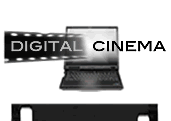 |
||||||||||||||

|
1. What do we mean by digital cinema? What aspects of film production, distribution, and consumption have been altered by the introduction of digital technologies? 2. Is digital cinema a fad or will it have a permanent impact on film culture? If the latter, what do you see as the scope and nature of that impact? Will digital cinema technologies encourage new kinds of films to be made? Will digital cinema remain marginal, a kind of avant-garde or grassroots film production, or will it be more likely to go mainstream and be directly linked to the commercial media industries? What relationship can we posit between the grassroots and commercial sides of digital cinema? 3. What factors have led to the rise of digital cinema? How is it related to earlier movements that encouraged amateur or grassroots media production? How is it related to avant-garde movements in cinema, to other DIY tendencies within the culture, to home movies, to the efforts of activists to create alternative media channels?? 4. What places and events (including digital film festivals) are making digital cinema more visible? How do these increase the visibility of digital cinema, build support for digital artists, and shape the aesthetics of this emerging art form? Speakers: Bart
Cheever, D.FILM
Digital Film Festival |
2. How open have the commercial portals been to works that challenge the cultural or political mainstream? Have you chosen to distribute your works through such channels or through some alternative structure? 3. Critics have suggested that the web is too diffused and fragmented to enable meaningful political activism? How would you respond to such criticisms? Can there be meaningful political communication through digital media? If so, what kinds of political change do you think could occur within this space? Can you point to any examples of such communication? What are the key elements that make these examples successful? Speakers: Vilma
Gregoropoulos, Could
Be Worse! |
| Case Study: Star Wars Fan Cinema 1:15 - 2:45pm 1. How has the introduction of digital cinema changed the status and visibility of amateur film production in the United States? 2. Many of the most visible early examples of digital cinema are parodies of existing works of mass media. Star Wars has been a particularly important catalyst for amateur cultural production and distribution. What does this suggest about the relationship between commercial and amateur media? 3. What relationship exists between the fan digital cinema movement and other traditional forms of cultural production within the fan community, such as zines and fan fiction? 4. These fan parodies pose important questions about intellectual property law in the United States. Are we seeing increasing conflict between new technologies that empower consumers to more fully participate in the production and circulation of popular culture and a legal culture that seeks to clamp down on alleged copyright infringement? How can we reconcile the two? Have you faced such conflicts around your work? How do you understand your own work's relationship to Lucasfilm's copyrighted and trademarked material? Why do you think there has been so little legal backlash against fan cinema in comparison to the cease and desist letters directed at fan websites that directly reproduce sound and video files from television series? 5. The amateur Star Wars films often make a virtue out of their own impoverished means of production. Do you think the goal of amateur filmmakers is to confront the technical challenge of trying to match professional special effects or to take pleasure in the gap between their cottage industry style and the Hollywood blockbuster? Speakers: Henry
Jenkins, MIT
Comparative Media Studies, Textual Poachers: Television
Fans and Participatory Culture |
|
1. What lessons have we learned so far about the kinds of films that work best in the digital environment? What factors, for example, have led to the focus on short film production for the web? Why might sound be as important or more important than visuals in this environment? What kinds of visuals work best on the small desktop window? 2. What draws you to digital film production? What do you hope to achieve in your digital films? How would you compare the aesthetic goals that draw you to digital film production with those associated with big screen film production? 3. If you have worked in both traditional and digital cinema, what do you see as the most salient differences between the two? What, if anything, can you achieve in digital cinema that would be more difficult to achieve in traditional film production? What, if anything, do you sacrifice in shifting towards digital? 4. What lessons can digital cinema learn from other forms of digital culture, such as computer games and hypertext? Will digital cinema necessarily be linear and self-contained or can it support some forms of interactivity and audience participation? Can new forms of digital films be made that blend digital video with web aesthetics? Speakers: Carlos
Cantu, Alex
Chisholm, and Christa Starr,
Can-Do-Home Productions, Earthen Vessels |
|
1. The current digital cinema movement was not born overnight. What can you tell us about the historical antecedents of this current wave of grassroots film production? How might we relate these current works to the history of amateur film in this country or to the history of avant-garde film production? 2. Some companies are digitizing earlier amateur films for exhibition and distribution on the Internet. What advice would you give them about such a project? What aspects of amateur cinema are important to preserve or get into broader circulation at the present moment? 3. We often speak of an opposition between the avant-garde and commercial cinema or between amateur and professional film production. Yet, some are arguing that the digital environment is breaking down this distinction. What are the risks and benefits to amateur filmmakers or experimental filmmakers in blurring the boundaries between grassroots and broadcast media? Speakers: Karen
Ishizuka, Japanese American National
Museum |